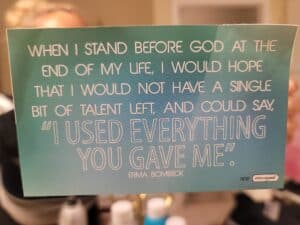DONNA: Hey there, welcome to A Healthy Conversation. So, if you’ve been watching for a while, you know that we’re not at the lake —
JOHN: Must be at the office.
DONNA: Definitely not at the lake. Not in the kitchen at the other house, so must be at John’s office, right? Because of all the pink and the purple —
JOHN: Yeah, that’s me.
DONNA: Yeah.
JOHN: Exactly.
DONNA: Okay so we’re in my office and if you haven’t watched A Healthy Conversation before, you’ll find that we move around a little bit, and we share the kind of conversations with you that John and I actually have with each other kind of everyday. Especially this weekend.
JOHN: Last couple of weeks.
DONNA: Yeah. So, I’m going to thank you first of all because if you follow me on Facebook, you know that I put a post up about needing personal prayers. I didn’t share what for because I was kind of rocking and reeling with the information I’d been given. Then a few days later I did share what the personal prayer request was for. I told you that I had been to a doctor’s appointment and the doctor looked at me and said, “Quite frankly Donna I’m surprised you’re even still here.” Now I was rocking and reeling a bit, like I said.
JOHN: Just a bit.
DONNA: Called you a little frantic. More on that in just a little bit. You need to be your own doctor. People have pain, they have low energy, digestive issues, headaches, they don’t feel good they’re going to go to the doctor just like you did when you had a condition many years ago and found out it was cancer. But we found out you have to be your own doctor. As a matter of fact, we’ve decided to tell people that if you’re going to go to the doctor, take somebody with you, right?
JOHN: Ask the smart questions like you did because when you have cancer your brain is mush, so you can’t think to ask the really smart questions. That’s where you came in.
DONNA: So, let’s go with what happened with cancer.
JOHN: Well after I had been diagnosed with cancer and had the surgery, the next course of action was, I think a week after the surgery, go back to the doctor and find out what the next course of action is. Well, the surgeon says, “Well we all met here and we decided that we are going to give you a complete lymph node dissection and then we’re going to give you chemotherapy.
DONNA: Better known as gutting you.
JOHN: Yeah.
DONNA: Because they wanted to cut him open from his collar bone to his pelvic bone. Open and remove all the lymph nodes.
JOHN: Take all the lymph nodes. So, we didn’t really like that diagnoses so we said let’s go up to Cleveland – Cleveland Clinic and get another diagnosis.
DONNA: So, we were recommended to a doctor up there.
JOHN: Well, another surgeon up there.
DONNA: Yup.
JOHN: Surgeons like to do surgery. So, we go up there and he looks at the CAT scans and he says, “Well I think we should do the lymph node dissection as well.
DONNA: Second doctor who told us he needed to be completely cut open and scooped out.
JOHN: Yeah. So luckily my cousin who is an RN up in Cleveland—we’re all from Cleveland originally—said, “John go over to University Hospital, our own cancer center.” She gave us the name of the first-rate oncologist, first rate urologist and go in to see him. And he looks at all the PET scans and all the CAT scans and he says, “Well I don’t see any active cancer. So, we’re going to keep you under observation.”
DONNA: “You’re a perfect candidate for the surveillance study.” That’s what he said.
JOHN: Exactly. “We’ll give you CAT scans every month.” He says, “If it comes back, we’ll give you some hot chemotherapy, we’ll get it out of your system. We have about an 80% chance of knocking it out.” And I said, “Well doctor” I said, “These other two doctors wanted to do a lymph node dissection on me” he says, and I can still see him like he’s standing right there and the guy’s passed away. He’s an angle as far I’m concerned. He says, “Those things are completely useless we haven’t done them in the last ten years.” I say, “Thank you Lord.”
DONNA: So, here’s the point we both want to make with you; you need to be your own doctor. Meaning, every doctor you go to is going to have a specialty, every doctor. And that doctor and that specialty is what they’re going to prescribe. It’s what they’re going to tell you because it’s what they know about. What we mean by being your own doctor is you’ve got a kind of peace mill; in the world we live in today you’ve got to take the information and put it together. I am telling you; you need to take someone with you with a note pad, with good questions and ask these good questions.
Now I went alone this last Thursday because I was going for something very routine. And when this doctor said this to me, like I said it kind of knocked the wind out of me. Not kind of, it knocked the wind out of me a lot. And I’m thanking you for your prayers. I fill you in more later on what’s happening. I have decided that I am going to be here for a very, very long time.
JOHN: Long time.
DONNA: Because I have to give him a hard time.
JOHN: Somebody’s has to get irritated.
DONNA: Yeah, if nothing else I’ve just got to be there to make John’s life interesting. The bottom line is with my situation and because of the 20/30 fast track plan you’ve heard us talk about a lot, I now am talking to, did I tell you seven when I was talking about this? Seven different people?
JOHN: No.
DONNA: When we were talking earlier on the phone today.
JOHN: Three or four. I think now you’ve got a couple more going.
DONNA: No, it was seven.
JOHN: Okay.
DONNA: Listen. He doesn’t listen to anything I say ever apparently.
JOHN: Why should I?
DONNA: This is why we talk to you guys that they can actually think that we listen.
JOHN: Get caught up, yeah.
DONNA: Anyway, seven different doctors and hormone experts who are all saying something different. I had one anti-aging doctor who we’re looking to to be a hormone expert who said to me, “You’re the healthiest person I’ve ever had in my office, oh, my gosh this is wonderful.” And then I had the guy last Thursday tell me –
JOHN: “I don’t know how you’re alive.”
DONNA: “I can’t believe you’re not dead.” So, more on that later. Be your own doctor, peace mill, go to different places. And you know how they used to say second opinion? Yeah, I think we’re going kybosh that. We’re going to say second —
JOHN: Third opinion.
DONNA: Third. Fourth.
JOHN: Maybe even a fourth.
DONNA: Yeah. And you matter. Take care of you. Now I’ve got to get back to taking care of him because I’m going to have to teach him to listen to me. Because apparently we talk, he doesn’t listen.
JOHN: Selective hearing.
DONNA: Oh. Thanks for tuning in. See you next time.









